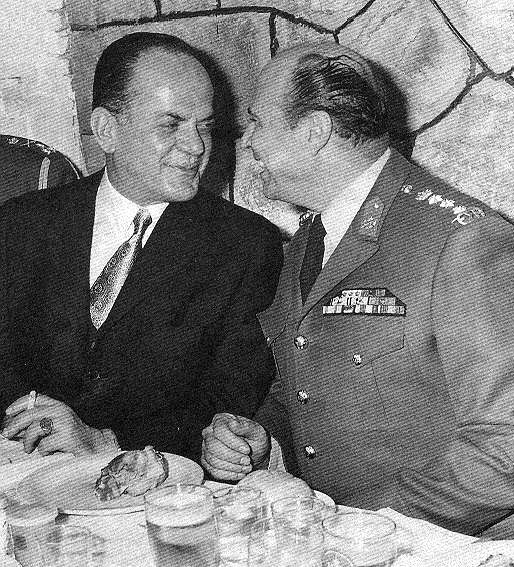<Back to Index>
- Colonel of the Artillery Nikolaos Makarezos (Νικόλαος Μακαρέζος), 1919
- Colonel of the Artillery Dimitrios Ioannidis (Δημήτριος Ιωαννίδης), 1923
PAGE SPONSOR
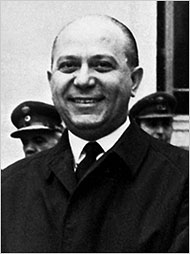
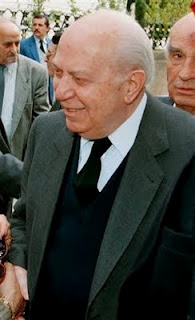
Nikolaos Makarezos (Greek: Νικόλαος Μακαρέζος; 1919 - 3 August 2009) was a Greek Army officer and one of the masterminds of the Greek military junta of 1967 - 1974.
He was born in 1919 in the village of Gravia, in the prefecture of Phocis. After finishing the local school and the gymnasium at Lamia, he entered the Hellenic Military Academy in 1937, graduating in 1940 with the rank of 2nd Lieutenant of Artillery. His first posting was in the 1st Heavy Artillery Regiment. He took part in the Greco - Italian War and the Battle of Greece, following which he served in the armed forces of the Greek government in exile. Following the war, he completed his studies at the Greek Artillery School at Megalo Pefko, where he also served as an instructor in later years. He also completed a course at the US Army's Artillery School at Babenhausen in West Germany, and studied Economics and Political Science. In 1962 - 1965, he was placed as a military attaché at the Greek embassy in Bonn.
Along with fellow Colonel Georgios Papadopoulos and Brigadier Stylianos Pattakos, he led the group of mid - ranking officers that overthrew the government of Panagiotis Kanellopoulos in a coup d'état on 21 April 1967 and established a military regime — the "Junta of the Colonels" — that lasted for seven years. Makarezos was a central figure in most of the ensuing dictatorial governments, as Coordination Minister until August 1971 and from then on until October 1973 as Deputy Prime Minister. Among the senior junta leadership, he alone had a knowledge of economics, so he was entrusted with the country's economy. The early years of the regime saw a notable economic boom, with increased development rates, low unemployment and low inflation. This was achieved through extensive foreign investments, the construction of infrastructure projects and considerable investments in the tourism industry. By 1973 however, the rate of development had begun falling, and the widespread corruption and financial scandals, as well as political stagnation, resulted in a drop in the regime's popularity. When Papadopoulos attempted to slowly democratize the regime in 1973, appointing the civilian Spyros Markezinis as Prime Minister, Makarezos was dropped from his government role.
Following the collapse of the junta in July 1974, Makarezos was placed under arrest and sent to the island of Kea. Along with other junta leaders, he was then put on trial for treason and rebellion. Found guilty and sentenced to death, his sentence was later commuted to life imprisonment.
Since 1990, Makarezos was released from jail on medical grounds on successive temporary leaves,
but was confined to his house. He claimed to have regrets for many of
his actions but continued to boast about his economic achievements
during the junta. He died on August 3, 2009.
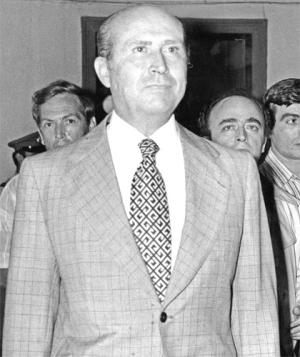
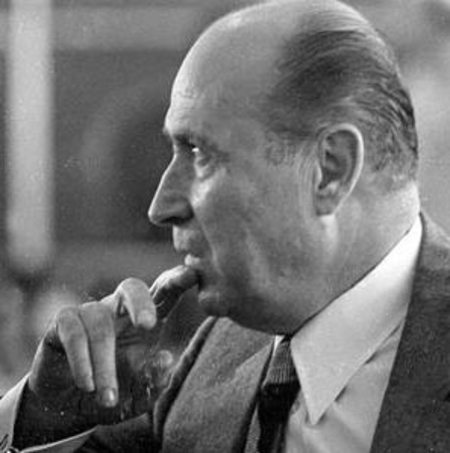

Dimitrios Ioannidis (Greek: Δημήτριος Ιωαννίδης, 13 March 1923 – 16 August 2010), also known as Dimitris Ioannidis, was a Greek military officer and one of the leading figures in the Greek military junta of 1967 – 1974.
He was born in Athens to a wealthy, upper middle class business family with roots in Epirus.
He studied at the Hellenic Military Academy and complemented his military education by studying at the Infantry School, the War School, and the School of Atomic - Chemical - Biological Warfare.
Ioannidis took an active part in planning and executing the coup d'etat of 21 April 1967, but despite his great power he preferred to stay in the shadows allowing George Papadopoulos to take the limelight. He thus gained the nickname "the Invisible Dictator". Ioannidis became chief of the Greek Military Police (ESA) which he developed into a feared paramilitary force of more than 20,000 men. The ESA men brutally hunted down and tortured political dissidents. They also became notorious for beating and insulting their nominal superiors, the Generals of the Greek Army, who were generally royalist or republican and opposed to the junta leadership.
After the Athens Polytechnic uprising of November 1973, Ioannidis, the most hardline of hardliners, became enraged with the "liberalizing" tendencies of the Papadopoulos leadership and hatched a plot to overthrow him using his loyal ESA forces. Indeed, on the night of 25 November 1973, Ioannidis overthrew Papadopoulos in a successful coup. Papadopoulos was arrested by the loyalists of Ioanidis in his opulent seaside villa at Lagonissi. This was the second successful coup d'etat by Ioannidis, following the original of April 1967 which had abolished democracy. Ioannidis proceeded to install his friend and fellow Epirote Phaedon Gizikis as figurehead President of Greece, although total power belonged to him.
Ioannidis pursued a savage crackdown internally and an aggressive expansionism externally. He was determined to annex Cyprus to Greece and achieve Enosis. He also felt a bitter personal antipathy towards the President of Cyprus, Archbishop Makarios III, considering him opportunistic and communistic. He called him the "Red Priest". To that end, he organized the 15 July 1974 coup d'état in Cyprus which overthrew the government of Archbishop Makarios III. This was the third successful coup organized by Ioannidis, and at first things seemed to go along according to plan. Ioannidis put in power one of his puppets, the right wing EOKA leader Nikos Sampson, and prepared to annex the island to Greece. However, the coup provided the pretext for Turkish invasion and partition of the island. This led to the Turkish invasion of the island on 20 July, which in turn led to the downfall of the Greek Junta and to metapolitefsi.
On 14 January 1975, Ioannidis was detained and tried on charges of high treason, rebellion, and of being an accessory to the manslaughters perpetrated during the Athens Polytechnic uprising. He was given a death sentence, later commuted to life imprisonment, which he was serving at Korydallos Prison.
On 21 July 2007, the 84 year old Ioannidis filed a request to be discharged for health reasons.
Imprisoned until his death, he died on 16 August 2010 from
respiratory problems, having been taken to hospital the previous night.
